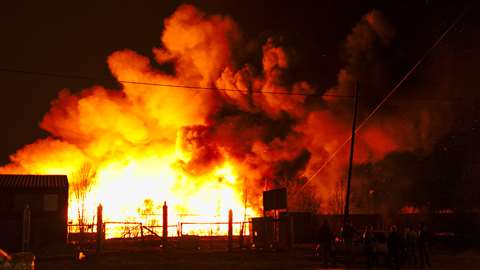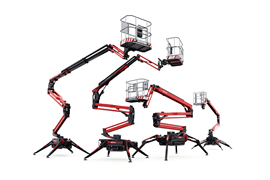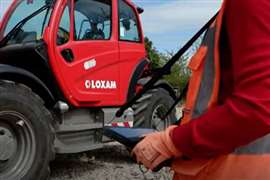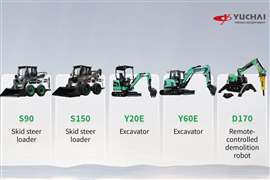Why are construction equipment fires increasing?
03 September 2021
Insurers and fire chiefs are warning that they have seen a recent spike in the number of fires breaking out in off road construction equipment as contractors come under mounting pressure to complete projects delayed by Covid lockdowns. Lucy Barnard finds out why.
When a tracked excavator caught fire in Wool, a small village in southern England, on March 2 this year, emitting plumes of black smoke and fierce orange flames, firefighters who attended the scene used breathing apparatus to extinguish the flames with hose reel jets.
But less than 24 hours later, fire crews were back in the area, dealing with another construction equipment fire. This time it was a large JCB excavator which had caught fire in the village of Bere Regis, near Wareham.
No-one was injured in either outbreak.
Although the incidents were not believed to be connected, fire chiefs are warning that they have seen a recent spike in the number of fires breaking out in off road construction equipment as contractors come under mounting pressure to complete projects delayed by covid lockdowns.
Spike in the number of fires
“The recent lockdowns and associated disruption to working patterns has led to machines being used for longer periods and perhaps not being maintained or cleaned as frequently as recommended,” Louise Knox, senior communications officer at Dorset & Wiltshire Fire & Rescue Service, told KHL.
Although fires in off road construction equipment remain relatively rare, a quick trawl through local newspaper headlines around the world shows recent fires occurring in towns and cities as disperate as Toronto, Oregon and New South Wales.
And, with dry gusty conditions currently fuelling a spate of wildfires in countries across Europe and North America, local authorities are increasingly concerned about activities which could potentially spark further blazes.
HSB, a UK-based insurer specialising in industrial equipment, says it has seen a rush of claims for off road vehicles since the pandemic.
It says that in the UK alone it saw a doubling in the amount of plant fire claims it handled in Q2 and Q3 2020 as contractors worked pumps, generators, excavators, dumpers, forklifts, tractors and road sweepers, sometimes around the clock, to make up for time lost during lockdown.
The insurer, which handled some £67.9m (US$93.9m) of gross written premiums across the board in 2020, reported that operational plant fire claims increased from 2-3% of total claims in 2019 to 5.9% in 2020, something it describes as “an unusual spike in activity.”
Impact of the pandemic
“Our claims data provides a clear indication that the pandemic has impacted on the number of plant fire claims we have seen,” says John Nicholls, product lead for construction at HSB.
Although Nicholls’ data only covers the UK and Ireland, and does not include any information about human injuries or fatalities caused by these fires, he says there could well be a similar pattern globally as contractors worldwide struggle to re-mobilise, using previously mothballed equipment.
 Photo - Mikhail Kryshen www.kryshen.net
Photo - Mikhail Kryshen www.kryshen.net
“As construction sites re-mobilised after the first lockdown and contractors sought to steer projects back on schedule, plant was worked harder than usual; placing additional stress on working parts and electrical systems.”
Nicholls says that the average size of claims increased from around £16,000 in 2019 to £25,000 in 2020 meaning that, although the number of claims doubled, the total value of claims tripped.
“The cost of replacement parts and repairs contributed to the average cost increase together with a higher number of larger value items,” he says.
Engines burning hotter
Fireward, a company which designs and installs fire suppression systems for off-road construction vehicles primarily in the UK, the US and the UAE is also reporting a spike in the number of times fire suppression systems have been activated in off road construction equipment.
Although Fireward says it is currently in the process of carrying out a full analysis of the incidence of the fires it has suppressed, sales director Mark Scutt, says that one of the key reasons for the increase is a series of modifications made by equipment manufacturers to the lower carbon output of diesel and petrol-driven engines by making them burn hotter.
“Equipment fires are a huge problem at the moment,” Scutt says. “In order to create better air quality, you need to physically burn more in the combustion chamber. This means detonating at higher temperatures. The risk associated with this is heat, and the right amount of heat along with oxygen and the introduction of a fuel will produce fire.”
“In the past few years we have seen the addition of turbos, diesel particulate filters and of course higher burning temperatures when detonating the fuel in the chamber. The engine components and the engine bay itself becomes very, very hot especially immediately after an engine has been turned off,” he adds. “The three key fire risk areas in an engine bay are the turbo, DPF system and exhaust system. With the temperatures they reach, any oil from the engine or a hydraulic hose will be at risk of catching alight.”
Fire suppression
To avoid these sorts of fires breaking out Scutt recommends following the manufacturer’s advice, (see box) ensuring that the machine is in a good serviceable condition, free from debris and that the daily checks are completed looking for oil leaks, and fuel leaks.
He also recommends choosing a fire suppression system adhering to Research Institute Sweden’s highest plant and equipment accreditation, P-Mark SPCR199, which has been tested not just for durability but for fire testing including hidden fires and high load fires.
“The number of these sorts of equipment fires is increasing,” Scutt says. “This is due to a number of factors which includes engines burning at higher temperatures but also includes cleaning and maintenance, the working environment and workload.”
Five key steps to eliminate equipment fires:
- Check for Oil Leaks
- Check for Short circuits
- Clean up Flammable Materials
- Check Key Switch
- Check Heat Shields:
Source: Hitachi Construction Machinery (Europe)
STAY CONNECTED



Receive the information you need when you need it through our world-leading magazines, newsletters and daily briefings.
CONNECT WITH THE TEAM














